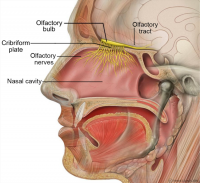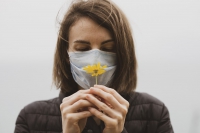Protective kamikaze cells
OUR INNER SUN TZU: KAMIKAZES AND SALAMANDER MAGIC
How loss of smell in Covid-19 might be our body’s own brilliant strategy to stay healthy
Kamikaze cells might be protecting the royal path to our brains
The loss of smell reported in Covid-19 could very well be our body’s own self-protective mechanism at play and not the virus! In this theory that is increasingly gaining support the cells in the nose that help us smell by receiving, processing and transmitting the information to our brains, these “smell cells” aka olfactory neurons, could become self-sacrificing kamikazes in order to prevent our brains from becoming infected.
Hotline
When we inhale, we draw in air carrying all sorts of particles including odour molecules. These molecules bind to receptors on our “smell cells” who send signals through a direct smell hotline to our brains. The hotline being the olfactory bulb and tract (see image underneath text).
Smuggle route for viruses
Because our brain is such a precious organ it is normally very well protected by a special barrier called the blood-brain barrier (BBB). The BBB being the border control which checks and decides what goes in and out. But..the smell hotline is an exception to this. There are no border patrols here so to say as this might cause a delay. Our body’s reason for that? As always: It’s critical for our survival. The vital information that is send through the smell hotline needs to travel quick in order to warn our brain against danger (fire, poisonous substances, food gone bad). Hence a perfect smuggle route for viruses to pass into our brain undetected….!
STRATEGY PHASE 1
Roadblock
A virus needs living cells in order to replicate and spread. If the olfactory neurons “blow them selves up” in a self-protective strategy the viruses get roadblocked on this royal path into the brain. In practice this idea is supported by several findings:
Loss of smell positive predictor
75 Percent of Covid-19 infected people experience loss of smell, though a much lower percentage of hospitalized patients has smell disturbance. In a study including 214 hospitalized patients only 5.1% had smell disturbance. That is a huge gap in prevalence! It looks like people who experience loss of smell are less likely to become seriously ill from Covid-19 and loss of smell might be a positive sign and predictor.
Smell hotline
In an older study they found that taking away part of the smell hotline (olfactory bulb) through surgical removal in mice successfully halted virus spread from the nose into the brain. These findings support the idea that loss of smell might be a strategy used by our body to prevent the virus from attacking our brain and us from getting more ill.
PHASE 2
“Salamander cells”
Sacrificing smelling over protecting the brain is a logical strategy, especially because our ”smell cells” (olfactory neurons ) have the unique quality to self-regenerate unlike most other type of neuron cells who cannot. Just like salamanders can regrow a limb, the “smell cells” can regrow and reconnect the smell hotline (olfactory bulb) to our brains😊
Smell regeneration
Olfactory neurons die and regrow every 30-120 days which corresponds with how long it takes to regain ones smell after Covid-19 infections, which usually lasts for a few weeks to a couple of months. Our body’s have created a brilliant loophole to make up for it’s hotline’s vulnerability! Yet another reason to marvel at and honor our body’s.
Research:
Is anosmia the price to pay in an immune-induced scorched-earth policy against COVID-19?
Anosmia in COVID-19 Associated with Injury to the Olfactory Bulbs Evident on MRI
Virus-induced neuronal apoptosis as pathological and protective responses of the host
From chemical neuroanatomy to an understanding of the olfactory system
Neurologic manifestations in hospitalized patients with COVID-19
Olfactory and gustatory dysfunctions as a clinical presentation of mild-to-moderate forms of the coronavirus disease (COVID-19): a multicenter European study
Severe Acute Respiratory Syndrome Coronavirus 2 Infects and Damages the Mature and Immature Olfactory Sensory Neurons of Hamsters
Magnetic Resonance Imaging Alteration of the Brain in a Patient With Coronavirus Disease 2019 (COVID-19) and Anosmia
Patrick J. Lynch, medical illustrator / CC BY (https://creativecommons.org/licenses/by/2.5)
Image by Engin Akyurt from Pixabay
Laura Hoekstra is a health educator focusing on the intersections of food, health and climate. With her background in Natural Medicine Laura looks at health (people and planet) through a holistic lens. She is a Certified Nutritionist and Naturopath and an advocate for Integrative, Personalized Medicine.
Reacties (2)
I would like to know if the doctor has cases of patients with symptoms caused by the covid 19 vaccine. My son has problems after the doses of Pfizer and I have not had medical follow-up. I'm worried and looking for a doctor in Amsterdam who knows the problem and can treat me
Dear miss/mister,
I am sorry to hear that your son experiences complaints. Have you contacted your GP and explained your concerns? Sometimes persons catch a Covid infection without noticing (in children Covid infection is often a-symptomatic) before or after a vaccination, this might also be the reason for his complaints. Discuss your worries with your GP and ask for tests related to his complaints or a referral to a pediatrician.











